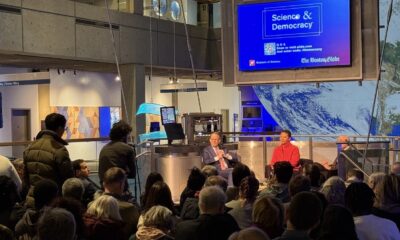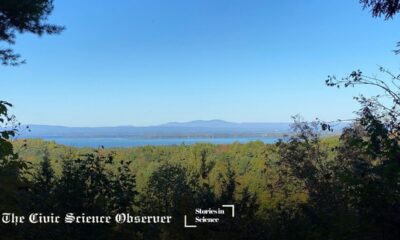Stories in Science Special Series
Lessons Learned Late-ish
David Poeppel: “I appeared in a number of plays and directed a few, as well. I toyed very seriously with the idea of pursuing this line of work, because I had great fun in that milieu and did not feel impostorish – but somehow the plan was derailed.”

David Poeppel
[su_boxbox title=”About”]Dr. David Poeppel is the Director of the Department of Neuroscience at the Max-Planck-Institute (MPIEA) in Frankfurt, Germany and a Professor of Psychology and Neural Science at NYU. Trained at MIT in cognitive science, linguistics, and neuroscience, he did his post-doctoral training at the University of California San Francisco, where he focused on functional brain imaging. Until 2008, he was a professor at the University of Maryland College Park, where he ran the Cognitive Neuroscience of Language laboratory. He has been a Fellow at the Wissenschaftskolleg (Institute for Advanced Studies Berlin), the American Academy Berlin, and a guest professor at numerous institutions. He is a Fellow of the American Association for the Advancement of Science. His research focuses on the brain basis of hearing, speech, language, and music, using a range of experimental approaches. He has published over 200 papers and chapters and lectures frequently on topics ranging from hearing to language processing to the conceptual foundations of cognition and neurobiology. The story below is co-published in collaboration with Growing up in Science. [/su_boxbox]
[su_boxnote note_color=”#d9d8d6″]Some Take Aways
- It’s OK not to be the smartest person in the room.
- Be a closer.[/su_boxnote]
[dropcap]I[/dropcap]n elementary school (in Cambridge, Massachusetts) and in high school (Gymnasium in München, Germany), I was quite good at sports and disruptive behavior, but quite mediocre at schoolwork. Under the (often contradictory) influence of my Venezuelan mother and German father, I managed to get through high school but without a clear intuition what to do next. After fleeing Germany for the US and floundering for a year or two, I started to study a not-entirely-coherent mixture of philosophy, cognitive science, linguistics, and neuroscience at MIT. However, my true passion was actually in other areas: acting and directing!

Dr. David Poeppel
I appeared in a number of plays and directed a few, as well. I toyed very seriously with the idea of pursuing this line of work, because I had great fun in that milieu and did not feel impostorish – but somehow the plan was derailed. (I still have “FOMO” about this.) After working in a monkey lab for a while (with Peter Schiller and Nikos Logothetis at MIT) and, crucially, after attending a bunch of lectures by Noam Chomsky on linguistics and cognitive science (which felt like a curtain was opened and a new intellectual vista presented), I ended up in graduate school at MIT. The cohort I was with in graduate school – as well as the faculty – were profoundly intimidating. They became good friends and colleagues, but the feeling of inadequacy never went away.
It’s OK not to be the smartest person in the room.
The solution was to put one foot in front of the other and pursue research projects that were modest and manageable. I picked topics that were conceptually controversial but did not require great technical facility (which I admit I lack). Two of the projects I worked on as a Ph.D. student (one on language acquisition, one on neuroimaging) led to papers that were discussed and criticized a lot, which had both good (recognition and job offers) and bad (reputation as cranky) consequences. This ultimately led to a weird couple of years as post-doc at UCSF, where I ended up not having a PI in charge (due to an unexpected PI move) and had to become the architect of my own research program – and my own undoing.
As an assistant, associate, and full professor at the University of Maryland College Park, I finally learned four key things. First, it’s OK not to be the smartest person in the room. It’s liberating to admit ignorance and not feel embarrassed. Second, be a closer. Finish your projects and papers and grants at a decent pace. Third, hire people that are really nice (the most important criterion), dedicated, have a sense of humor, and are smarter than you (in some clear way). Fourth, if you are lucky, someone senior who champions your work can have a huge influence – by pointing out grant opportunities, supporting you in front of others, believing in your work. After 8 or so years, my wife, our three sons, and I moved to New York City, which is more exciting than suburban Washington DC. The colleagues at NYU were and still are as intimidating as the folks from MIT, but I didn’t care anymore – I had finally learned that I was good at some things and lousy at others, and that’s OK…
Of the work that I have produced, there are 10 or so papers over the course of my career that I am genuinely proud of. What has given me the most professional pleasure is the group of graduate students and post-docs that I have had the fortune to work with over the years. I am acutely aware of the fact – in large part based on my pervasive and long-lasting impostor syndrome – that my professional success derives almost entirely from my lab members’ originality, creativity, hard work, and the generation of a truly fun, funny, and productive work environment.
Metrics
Sessions
Total number of Sessions. A session is the period time a user is actively engaged with the page.
Visitors
Users that have had at least one session within the selected date range. Includes both new and returning users.
Page views
Pageviews is the total number of time the article was viewed. Repeated views are counted.
The CS Media Lab is a Boston-anchored civic science news collective with local, national and global coverage on TV, digital print, and radio through CivicSciTV, CivicSciTimes, and CivicSciRadio. Programs include Questions of the Day, Changemakers, QuickTake, Consider This Next, Stories in Science, Sai Resident Collective and more.

-
Audio Studio1 month ago
“Reading it opened up a whole new world.” Kim Steele on building her company ‘Documentaries Don’t Work’
-
 Civic Science Observer1 week ago
Civic Science Observer1 week ago‘Science policy’ Google searches spiked in 2025. What does that mean?
-
Civic Science Observer1 month ago
Our developing civic science photojournalism experiment: Photos from 2025
-
Civic Science Observer1 month ago
Together again: Day 1 of the 2025 ASTC conference in black and white
Contact
Menu
Designed with WordPress
























